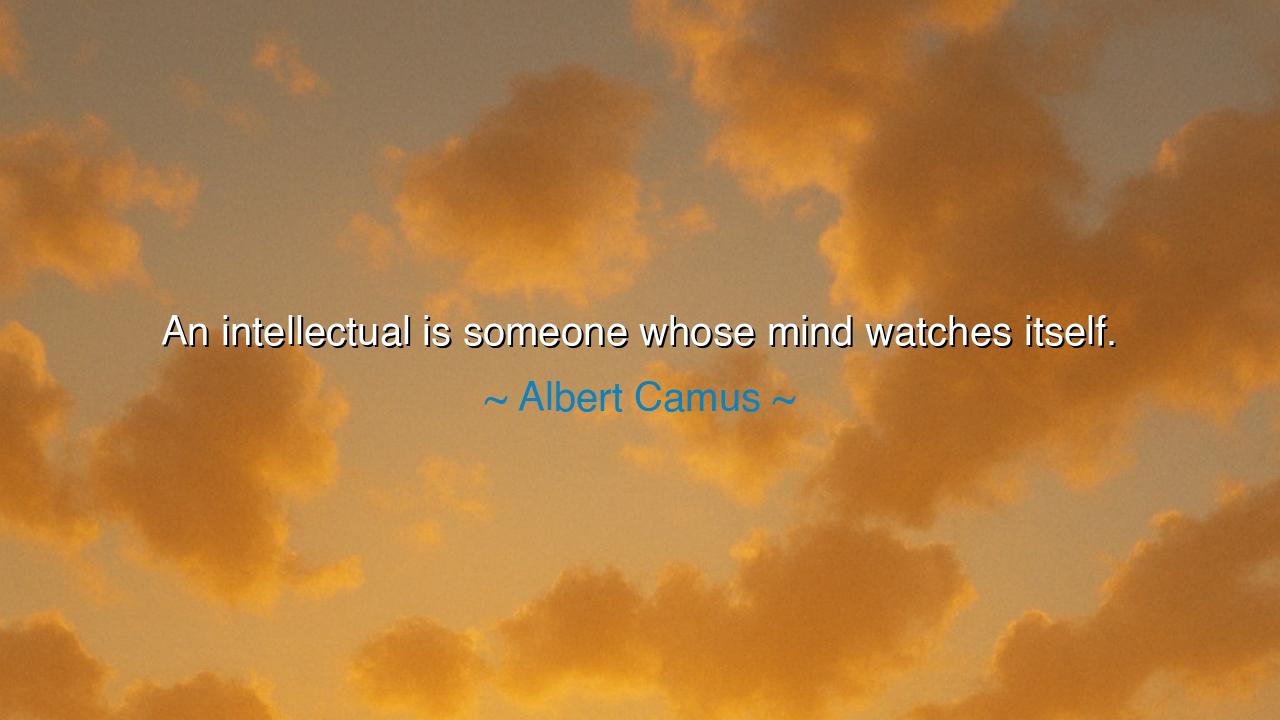
An intellectual is someone whose mind watches itself.






In the reflective chambers of the human soul, Albert Camus, the philosopher of the absurd and the poet of clarity, wrote these immortal words: “An intellectual is someone whose mind watches itself.” In this short but profound statement, Camus captures the essence of conscious thought, of the mind that is not only thinking, but aware of its own thinking. It is the mark of the true intellectual—not in the quantity of knowledge possessed, but in the quality of awareness, the quiet vigilance of the spirit observing itself. To be such a person is to stand apart from one’s own mind, to see the rise and fall of thought as the ocean watches its waves, knowing they are both its creation and its passing form.
The origin of this quote lies in Camus’ reflections on the nature of intelligence and self-awareness during the mid-twentieth century, an era shadowed by war and existential doubt. Camus lived in a time when intellect was often confused with ideology, and brilliance with dogma. Yet he believed that the true intellectual was not the one who loudly proclaimed theories, but the one who could silently question even his own reasoning. To “watch one’s mind” is to live with lucidity—to see one’s motives, fears, and illusions without denial. It is the awakening of consciousness, the sacred pause before action, where wisdom begins.
To watch the mind is no small task. Most men and women live as though carried by the current of their own thoughts, mistaking the rush of ideas for clarity and the noise of opinion for truth. But the intellectual, as Camus describes, steps back and observes—he asks, Why do I think this? From where does this belief arise? What emotion colors this conclusion? This act of introspection is both discipline and art, for it demands humility and patience. The unexamined mind, however brilliant, becomes a prisoner of its own reflexes. The watched mind, by contrast, becomes free—aware of its limitations, capable of balance, and open to truth.
Consider the example of Socrates, the eternal gadfly of Athens. Surrounded by those who claimed to know, he alone confessed ignorance. Yet this humility was not weakness—it was awareness. Socrates watched his own thoughts as he questioned others, peeling away pretense to reveal the raw essence of understanding. When condemned to death, he remained calm, saying that philosophy was a preparation for the soul’s release from illusion. His life was a living embodiment of Camus’ truth—a mind forever awake, forever observing itself.
Camus, like Socrates, knew that self-awareness is both burden and liberation. To see one’s own contradictions is painful; to confront the absurdity of existence without flinching requires courage. Yet this very confrontation is the birth of dignity. The intellectual, in Camus’ view, must not seek comfort in systems or certainty. He must dwell in the tension between what he knows and what he cannot know, watching his thoughts as one watches a flame—beautiful, fleeting, and dangerous. The mind that observes itself does not fall prey to illusion; it burns with clarity.
But there is also danger in over-reflection. To watch one’s mind too closely can lead to paralysis, to the endless mirror of self-analysis. Thus, the wise must find harmony: to be aware without being trapped by awareness, to think deeply yet act decisively. The intellectual’s strength lies not in detachment alone, but in the ability to return from introspection with renewed compassion and understanding. Thought, like a sword, must be sharpened in silence but used in service of life.
The lesson, my children of thought and reason, is clear: do not let your mind wander unguarded. Learn to observe your thoughts as you would the movement of clouds—shifting, transient, shaped by unseen winds. When anger rises, watch it. When pride whispers, listen and understand its source. When clarity dawns, hold it lightly, knowing it too shall fade. In this way, you will come to know yourself not as a creature of habit, but as a conscious being—a guardian of your own inner world.
So, walk through life as Camus taught—not merely as a thinker, but as a witness to your own thinking. Let your intellect be not a weapon of vanity, but a mirror polished by humility. For the mind that watches itself is not consumed by confusion; it becomes radiant with understanding. And when you can see your own thoughts clearly, the world itself will seem clearer too—for you will have mastered not knowledge alone, but the art of wisdom.






AAdministratorAdministrator
Welcome, honored guests. Please leave a comment, we will respond soon